That was a great post! It put the whole situation in perspective and was very well written.
Let the ruling classes tremble – an Interactive Revolutionary AAR
- Thread starter Tommy4ever
- Start date
-
We have updated our Community Code of Conduct. Please read through the new rules for the forum that are an integral part of Paradox Interactive’s User Agreement.
You are using an out of date browser. It may not display this or other websites correctly.
You should upgrade or use an alternative browser.
You should upgrade or use an alternative browser.
- Status
- Not open for further replies.
Aha! That bourgouise lapdog may refuse to admit it, but we have won our freedom from the opression of the ruling classes!
Ehre sei dem neuen, freien, kommunistische Reich!
Ehre sei dem neuen, freien, kommunistische Reich!
Just curious, but will there be any chance for national unity under a socialist banner for Germany? Perhaps under East Germany's flag?
One does not simply beat an Prussian army.
Verräterisch!
Ohne Ehre!
No you cannot simply beat a Prussian army - you must destroy it.
Don't be too hard on yourself. Your were trying to cover a lot of action for a single post.
Can the next post include a map? My Rhineland geogrpahy is a bit sketchy.
Next update is a roundup of the VSVR and will include many things from population graphs to maps.
That was a great post! It put the whole situation in perspective and was very well written.
Thanks.
Aha! That bourgouise lapdog may refuse to admit it, but we have won our freedom from the opression of the ruling classes!
Ehre sei dem neuen, freien, kommunistische Reich!
Hurrah! Those ruling classes better being trembling! *shakes fist*
This what happens when the people are united!
Yeah I agree, a map would be nice.
Again map to come in the next update. I plan on giving you a map of all of Europe. I didn't start the game in 1850 but in 1836 so there are a few terretorial changes.
Just curious, but will there be any chance for national unity under a socialist banner for Germany? Perhaps under East Germany's flag?
I'm using the Germany tag for the VSVR. That means I get 0bb CBs on all German land.
I have North German as my primary and South German as my secondary culture.
However the flag is the raised fist banner that you can see in my first post.
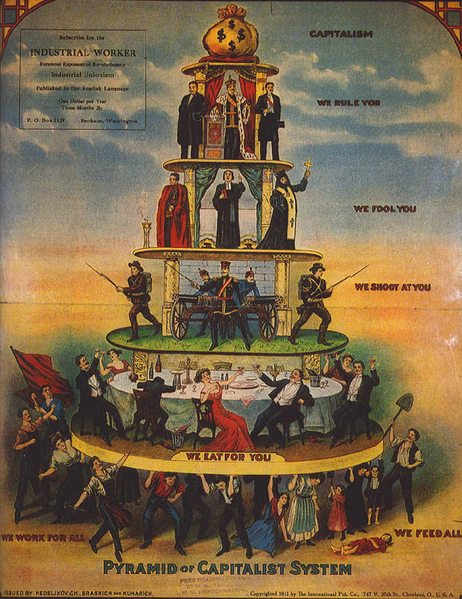
Moving on I'd like to ask your opinions for a pie chart I want to do tommorow:
To go along with the normal population chart you get in game I'd like to make one that details the classes of my population.
At the moment I'm sure of the following classes - Proleteriat = Craftsmen, Clerks, Labourers (I can think of barely anything so appropriate to this class as working down a mine), Bureaucrats
Military Classes (I know soldiers should probably be proleterian but I'm putting them together with Officers in this class) = Soldiers and Officers
Aristocrats = Aristocrats
Rural Proleteriat = Farmers (I'm not sure what Germany was like in 1850 but I think it was past peasants)
Bourgeoisie = Capatalists + ?
My question is what should Artisans be? My first thought was to make the Bourgeois but Marx himself defined this sort of person as being Petite-Bourgeois rather than full blown Bourgoisie. According to him this class would be absorbed into the proleteriat (although they own capital they tend to earn only slightly more than the workers) whilst the Bourgeoisie proper was to be totally eliminated. So what do you think? Should Artisans be more Bourgeoisia or should they have their own class on my pie chart of the Rhineland (I'll also make a seperate one for the Ruhr as it is very different to the rest of the country).
It depends whether you try to be a modern industrialized state, if not, then you need the artisans for the survival of the state.
But they might need to be re-educate to fit the modern world.
And whether free trade, laissez faire and enterprise is allowed.
But they might need to be re-educate to fit the modern world.
And whether free trade, laissez faire and enterprise is allowed.
Artisans, in the Communist Manifesto system, are neither bourgeois nor proletarian - they are a middle class that is becoming extinct as they are replaced by proletarians working cheaper for the bourgeois in factories. I think they way they are represented in Vic2 fits that description rather nicely. You can name them petty-bourgeois.
"Die Partei, die Partei, die hat immer recht..." (transl. Remember kids - The Party is always right!)
This should be interesting...
This should be interesting...
Last edited:
Those were some unexpectedly aggressive moves by my compatriots!  But I guess it's not that farfetched, considering in Real Life we had just (unsuccessfully) tried to beat down the Belgians a few years earlier.
But I guess it's not that farfetched, considering in Real Life we had just (unsuccessfully) tried to beat down the Belgians a few years earlier.
As others have said, you covered a lot of ground. You also made a plausible cause for how the Revolution managed to succeed in the Rhineland, even in the face of joint Prusso-Dutch aggresion.
Having read your explanation of Blanquism, I am now well-soured on the man. At least he's a counterweight to the Marxists... Maybe, if the Marxists and Blanqui can butt heads enough, the others can band together and actually get some stuff done.
As others have said, you covered a lot of ground. You also made a plausible cause for how the Revolution managed to succeed in the Rhineland, even in the face of joint Prusso-Dutch aggresion.
Having read your explanation of Blanquism, I am now well-soured on the man. At least he's a counterweight to the Marxists... Maybe, if the Marxists and Blanqui can butt heads enough, the others can band together and actually get some stuff done.
This may seem like a bit of an odd question, but will we get our own characters? Or will we represent the usual generic peasants and commoners?
Perhaps Engels may even develop his own agenda, he can't possibly be too happy with position that holds little practical power given he was the co-writer of the communist manifesto, may a split within the Marxist faction occur? 
Nice starting post, laid out the background very nicely! This should be fun. À bas avec le bourgoise!
Sadly the road to freedom has been bloody so far, but surely this will motivate the People to work collectively to ensure our noble cause is a success. Fraternally yours...
The VSVR in 1850
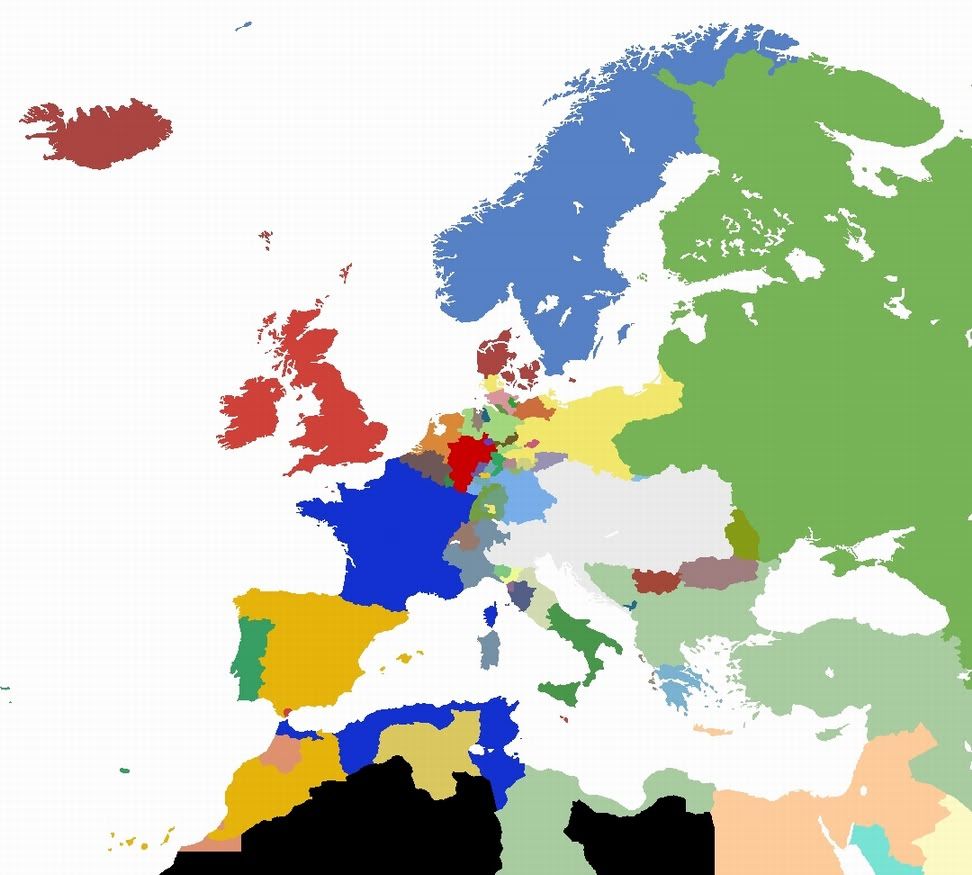
In 1850 the VSVR was largely surrounded. To the West lay the Benelux countries, to the South the powerful Kingdom of France and to the East the German States – all of them in the pockets of the reactionary monarchs of Vienna and Berlin.
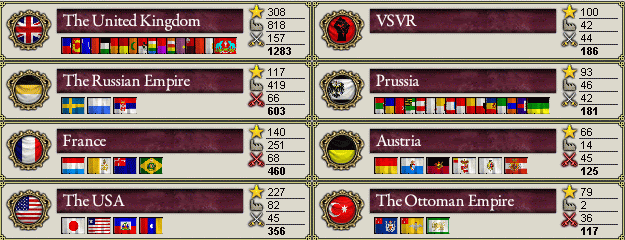
Despite this perilous geopolitical situation the Republic was amongst the most powerful states on earth. Cologne was the centre of a great philosophical movement as lefts of all colours flocked to the city and its Universities where they could freely develop new political ideas, not just being accepted by the state but being encouraged by it. The industrial might of the Ruhr also bolstered the Republic’s economy whilst the military had already shown that it was more than a match for even the infamous Prussian Army.
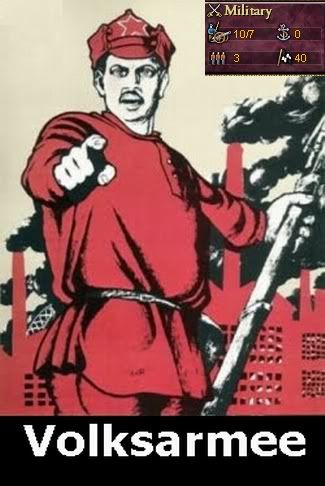
Even with peace with Prussia the Republic’s leaders were under no illusions that they were in any way safe. Weydemeyer was given a large standing army of some 30,000 men whilst a further 9,000 remained in reserve. The People’s Army (now more commonly referred to as the Red Army) was divided into three Corps. In the Saar one Corps of 12,000 infantrymen defended the border forts with France. In the North-East a 6,000 man Cavalry Corps kept watch whilst in Cologne a further 12,000 infantrymen maintained a central command. The army was large and was regarded by many as too large for the state to maintain. It was feared that if any serious losses were suffered then the current formations could not be replenished with fresh soldiers. The Anarchists were even arguing for a downsizing of the standing army by 9,000 men (calling for the reduction of 3,000 from each Corps).
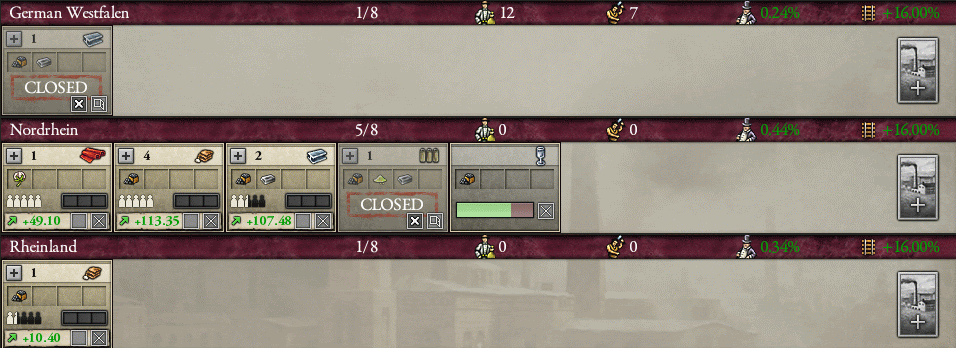
Rhenish industry was almost entirely based on the Ruhr. Here regional laissez-faire and free trade policies had allowed the Bourgeoisie to rapidly develop the territory. Whilst they benefited from the impressive profits made in the Ruhr the newly emerged Proletarian class had been left impoverished and powerless. Now this same industry which was used as a tool of the ruling classes to keep the people down would become the centre-piece to the empowerment of the masses.
The population of the Rhineland at the start of 1850 was 3.84 million. It is important to note that the same territory had a population approaching 4.4 million just ten years before. However Prussian economic mismanagement and a lack of care for their people meant that this wealthy territory could not respond to the failure of its harvest during the early 1840s. As many as 100,000 people died whilst a further 300,000 left during the famines that stretched from 1841 until 1847. This famine is another key reason why the revolution was so much more popular with the people in 1848 as the Rhineland, more than anywhere else in Germany, had suffered terrible from the poor harvest – losing almost 10% of its population.

The majority of the working men of the Rhineland were miners; more specifically they were coal miners. These men were commonly referred to as the rural proletarians as like their urban counterparts their work made use of new technology, they were skilled and most were well educated.
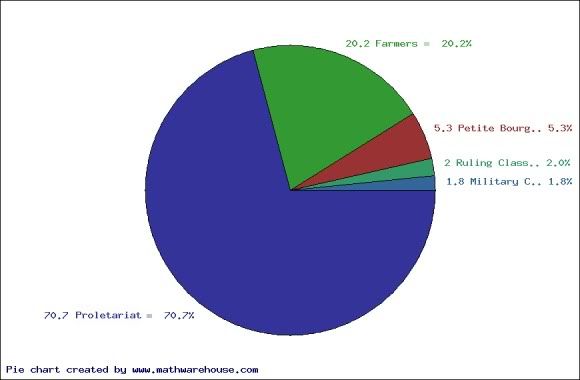
Proletariat – Labourers, Craftsmen, Clerks, Bureaucrats and Educational Professionals (Clergymen in game)
Farmers – Farmers
Military Classes – Soldiers and Officers
Petite Bourgeoisie – Artisans
Ruling Classes – Aristocrats and Capitalists
As a whole the Rhineland was already solidly proletarian in character. However there still existed two major problems. Firstly there remained a ruling elite (around 2% of the population) that owned the vast majority of the nation’s wealth – this class would have to be liquidated. However the second problem was far more complex, that was the problem of the Petite Bourgeoisie. This class was what lay between the ruling classes and the people. Like the ruling classes these shopkeepers and small businessmen controlled capital and many even hired workers. However unlike the Bourgeoisie they had not grown fat off the profits of enterprise and instead earned only slightly more than the normal proletarians. Yet Marx himself theorised that the owners of capital would always be at odds with the proletariat – after all those who hired labour would always strive to keep wages as low as possible whilst the proletariat would always try to keep them as high as possible. Different factions within the People’s Party had very different views on how to solve the ‘Artisan Problem’. Some extremist advocated their liquidation along with the ruling classes, most favoured a policy of pacifly ignoring the class whilst some of the most moderate groups believed the Artisan class should even be encouraged.

The situation in the Ruhr was significantly different to that in the Rhineland as a whole. Here around 15% of the population was made up of factory workers whilst there were very few farmers. Most of the countryside was dominated by small towns and mining communities. The region also, understandably considering its more urban nature, had an even larger Artisan population than the rest of the country.
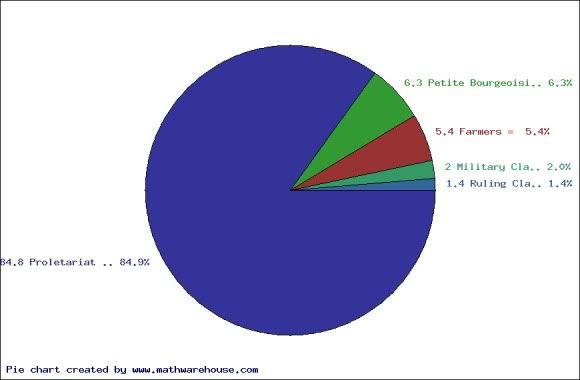
The Ruhr was regarded as being close to the societal idea by many with the People’s Party with a huge Proletarian population but a good mix of rural and urban workers. However it did have some major problems. In this most wealthy of territories an even smaller ruling elite controlled the region’s vast wealth whilst there was an even larger petty Bourgeois population. At the same time there were some fears that if the number of agricultural workers remained so low there could be problems with famines in the future.
In 1850 the VSVR was a nation of many problems but many advantages. Its ruling factions maintained a similar vision of where they wanted society to end up, but all had very different idea of how to get there.

In 1850 the VSVR was largely surrounded. To the West lay the Benelux countries, to the South the powerful Kingdom of France and to the East the German States – all of them in the pockets of the reactionary monarchs of Vienna and Berlin.

Despite this perilous geopolitical situation the Republic was amongst the most powerful states on earth. Cologne was the centre of a great philosophical movement as lefts of all colours flocked to the city and its Universities where they could freely develop new political ideas, not just being accepted by the state but being encouraged by it. The industrial might of the Ruhr also bolstered the Republic’s economy whilst the military had already shown that it was more than a match for even the infamous Prussian Army.

Even with peace with Prussia the Republic’s leaders were under no illusions that they were in any way safe. Weydemeyer was given a large standing army of some 30,000 men whilst a further 9,000 remained in reserve. The People’s Army (now more commonly referred to as the Red Army) was divided into three Corps. In the Saar one Corps of 12,000 infantrymen defended the border forts with France. In the North-East a 6,000 man Cavalry Corps kept watch whilst in Cologne a further 12,000 infantrymen maintained a central command. The army was large and was regarded by many as too large for the state to maintain. It was feared that if any serious losses were suffered then the current formations could not be replenished with fresh soldiers. The Anarchists were even arguing for a downsizing of the standing army by 9,000 men (calling for the reduction of 3,000 from each Corps).

Rhenish industry was almost entirely based on the Ruhr. Here regional laissez-faire and free trade policies had allowed the Bourgeoisie to rapidly develop the territory. Whilst they benefited from the impressive profits made in the Ruhr the newly emerged Proletarian class had been left impoverished and powerless. Now this same industry which was used as a tool of the ruling classes to keep the people down would become the centre-piece to the empowerment of the masses.
The population of the Rhineland at the start of 1850 was 3.84 million. It is important to note that the same territory had a population approaching 4.4 million just ten years before. However Prussian economic mismanagement and a lack of care for their people meant that this wealthy territory could not respond to the failure of its harvest during the early 1840s. As many as 100,000 people died whilst a further 300,000 left during the famines that stretched from 1841 until 1847. This famine is another key reason why the revolution was so much more popular with the people in 1848 as the Rhineland, more than anywhere else in Germany, had suffered terrible from the poor harvest – losing almost 10% of its population.

The majority of the working men of the Rhineland were miners; more specifically they were coal miners. These men were commonly referred to as the rural proletarians as like their urban counterparts their work made use of new technology, they were skilled and most were well educated.

Proletariat – Labourers, Craftsmen, Clerks, Bureaucrats and Educational Professionals (Clergymen in game)
Farmers – Farmers
Military Classes – Soldiers and Officers
Petite Bourgeoisie – Artisans
Ruling Classes – Aristocrats and Capitalists
As a whole the Rhineland was already solidly proletarian in character. However there still existed two major problems. Firstly there remained a ruling elite (around 2% of the population) that owned the vast majority of the nation’s wealth – this class would have to be liquidated. However the second problem was far more complex, that was the problem of the Petite Bourgeoisie. This class was what lay between the ruling classes and the people. Like the ruling classes these shopkeepers and small businessmen controlled capital and many even hired workers. However unlike the Bourgeoisie they had not grown fat off the profits of enterprise and instead earned only slightly more than the normal proletarians. Yet Marx himself theorised that the owners of capital would always be at odds with the proletariat – after all those who hired labour would always strive to keep wages as low as possible whilst the proletariat would always try to keep them as high as possible. Different factions within the People’s Party had very different views on how to solve the ‘Artisan Problem’. Some extremist advocated their liquidation along with the ruling classes, most favoured a policy of pacifly ignoring the class whilst some of the most moderate groups believed the Artisan class should even be encouraged.

The situation in the Ruhr was significantly different to that in the Rhineland as a whole. Here around 15% of the population was made up of factory workers whilst there were very few farmers. Most of the countryside was dominated by small towns and mining communities. The region also, understandably considering its more urban nature, had an even larger Artisan population than the rest of the country.

The Ruhr was regarded as being close to the societal idea by many with the People’s Party with a huge Proletarian population but a good mix of rural and urban workers. However it did have some major problems. In this most wealthy of territories an even smaller ruling elite controlled the region’s vast wealth whilst there was an even larger petty Bourgeois population. At the same time there were some fears that if the number of agricultural workers remained so low there could be problems with famines in the future.
In 1850 the VSVR was a nation of many problems but many advantages. Its ruling factions maintained a similar vision of where they wanted society to end up, but all had very different idea of how to get there.
Artisans, in the Communist Manifesto system, are neither bourgeois nor proletarian - they are a middle class that is becoming extinct as they are replaced by proletarians working cheaper for the bourgeois in factories. I think they way they are represented in Vic2 fits that description rather nicely. You can name them petty-bourgeois.
Well Artisans aren't mentioned in the Communist Manifesto. But Petty (or Petite) Bourgeois are so I counted Artisans as being them.
This may seem like a bit of an odd question, but will we get our own characters? Or will we represent the usual generic peasants and commoners?
At the moment you guys represent the membership of the People's Party.
If you've read the rules you will know that I don't want anyone using alternate nicknames (the mods don't like it).
Obviously as we go further into the game I'll have to bring in new characters. If any of you 'wow me' then I might include you
Perhaps Engels may even develop his own agenda, he can't possibly be too happy with position that holds little practical power given he was the co-writer of the communist manifesto, may a split within the Marxist faction occur?
I doubt Engels would abandon Marx. In RL he didn't seem to mind being sidelined that much and always down played his role in the works with Marx. Basically he pointed to Marx as the true genius behind their works. I'm sure he knows Marx won't allow him to sink any further.
What about Clergy?
The in game Clergy pop become educational proffessionals (everything from teachers to lecturers). I still have no idea why Pdox made Clergy the only thing that can educate people (it was a very bad idea). In the story however the elimination of religion will be a big topic for discussion between the factions.
Great concept and story, this will be very interesting to follow!
Thanks for the compliment and for dropping your first post here!
- Status
- Not open for further replies.

